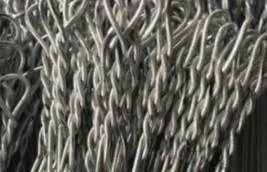-
 Phone:
Phone: -
 Email:
Email:

Understanding the Thickness and Strength of Coat Hanger Wire Gauge
Understanding the Gauge of Coat Hanger Wire An Essential Guide
Coat hangers may seem like simple household items, but when it comes to their construction, particularly the gauge of wire used, there is more to these everyday objects than meets the eye. The gauge of coat hanger wire not only determines the strength and durability of the hanger but also influences its functionality and suitability for different types of clothing.
What is Wire Gauge?
The term gauge refers to the thickness of the wire used to make coat hangers. The American Wire Gauge (AWG) system is commonly used to measure wire thickness. In this system, a higher gauge number indicates thinner wire, while a lower gauge number denotes thicker wire. For example, a 12-gauge wire is thicker than a 16-gauge wire.
Common Gauge Sizes for Coat Hangers
Most coat hangers fall within the range of 12 to 16 gauge. 12-gauge wire hangers are robust and can support heavy winter coats and other bulky garments without bending or breaking. In contrast, 16-gauge hangers are finer and more delicate, making them suitable for lighter items like blouses or dress shirts. The choice of gauge depends significantly on the intended use of the coat hanger and the types of clothing it will hold.
Strength and Durability
gauge of coat hanger wire

The gauge of the wire directly impacts the strength and durability of the coat hanger. Thicker wires (lower gauge numbers) generally provide better support and are less likely to deform over time. This makes them ideal for heavy clothing items such as jackets and coats. On the other hand, thinner wires (higher gauge numbers) may bend easily under the weight of heavier garments, resulting in damaged clothes or a compromised hanger.
Additionally, the material of the wire also plays a role in durability. While many coat hangers are made from metal, which is strong and flexible, some are made from plastic, which can be more susceptible to wear and breakage over time, especially if they are thinner than conventional metal hangers.
Suitability for Different Clothing Types
When selecting coat hangers, it is essential to match the gauge of the wire to the types of clothing being stored. For bulkier items such as winter coats or heavier dresses, a thicker gauge hanger is necessary to provide adequate support. Conversely, a lighter gauge might suffice for items such as light shirts, blouses, or delicate fabrics, where a thicker hanger would be unnecessary and could cause damage due to stress or stretching.
The right gauge also helps maintain the shape of the clothing during storage. Coats and jackets stored on inappropriate hangers can develop unwanted creases, marks, or distortions that may require steaming or ironing to correct.
Conclusion
In summary, the gauge of coat hanger wire is a critical factor in the effectiveness and longevity of these everyday items. Understanding the difference between various gauge sizes can help users select the appropriate hanger for their specific needs, ensuring that their garments remain in pristine condition. Whether you prefer stronger metal hangers for your winter wear or lighter plastic ones for your summer wardrobe, considering the gauge of the wire should be a key factor in your purchasing decision. With the right coat hangers, you can protect your clothing investment and maintain an organized closet space.
-
Wire Mesh for Every Need: A Practical SolutionNewsJul.25,2025
-
Steel Fences: Durable, Secure, and Stylish OptionsNewsJul.25,2025
-
Roll Top Fencing: A Smart Solution for Safety and SecurityNewsJul.25,2025
-
Cattle Farm Fencing Solutions for Maximum SecurityNewsJul.25,2025
-
Affordable Iron Binding Wire SolutionsNewsJul.25,2025
-
Affordable Galvanized Wire SolutionsNewsJul.25,2025
-
Wire Hanger Recycling IdeasNewsJul.25,2025








